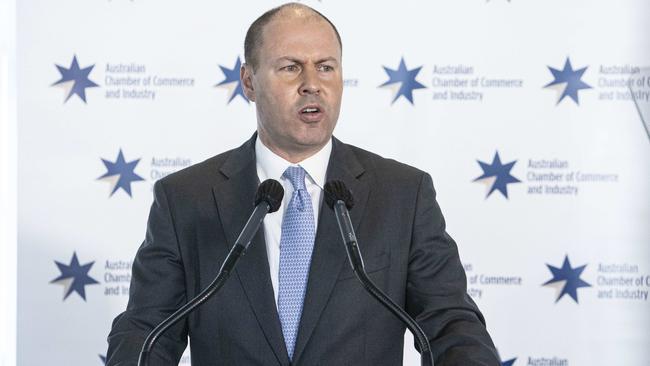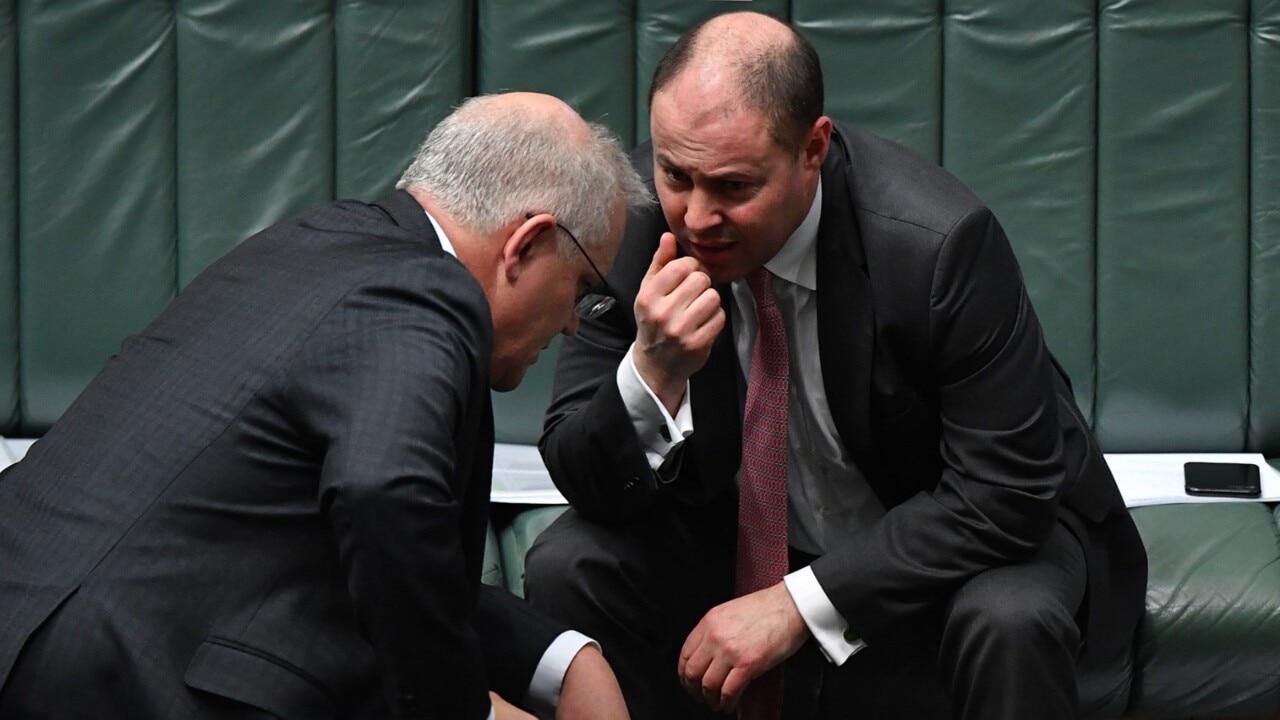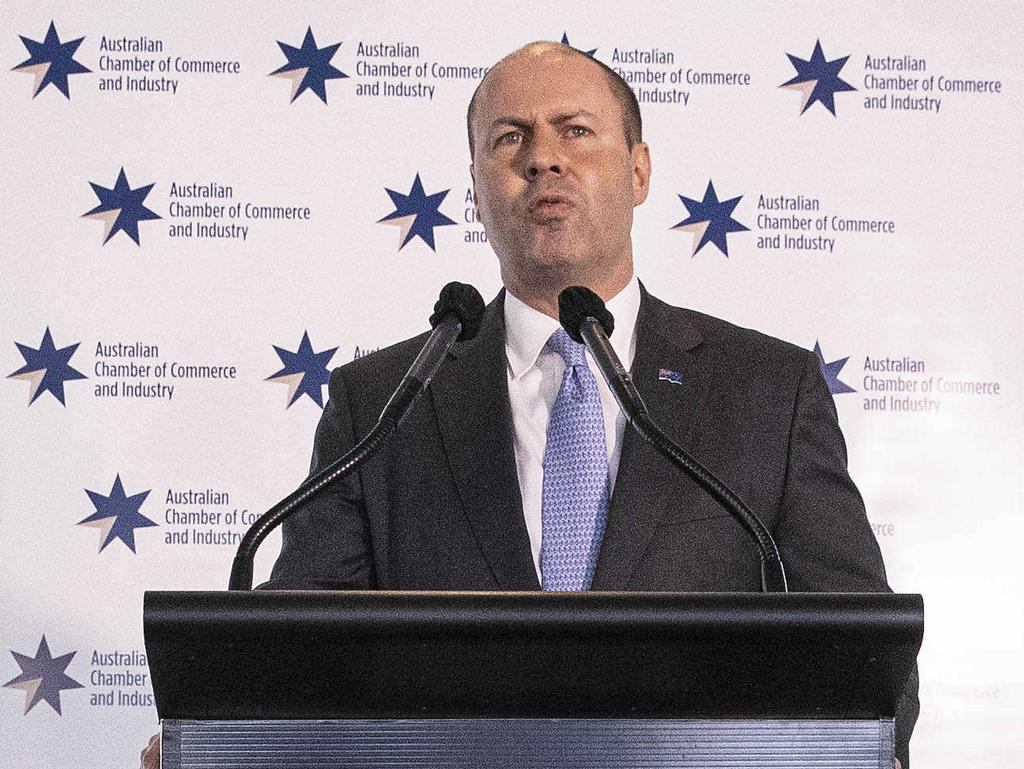Coronavirus recession: Unshackled banks told — go for loans
Lending laws imposed on banks during the GFC will be abolished in a bid to inject an ‘adrenaline shot’ into the economy.

Lending laws imposed on banks during the global financial crisis will be abolished in a bid to inject an “adrenaline shot” into the economy by lifting onerous barriers for home buyers and small businesses to access loans.
In a major structural shake-up of the 2009 consumer credit protection laws passed by the Rudd government, about 100 pages of regulation will be torn up to help funnel billions of dollars of locked up credit back into the economy.
After warnings from the Reserve Bank of a credit freeze because banks were becoming too scared to lend, Josh Frydenberg will ease the liability imposed on banks over so-called bad loans and shift responsibility to the borrower.
Small businesses, which face the toughest hurdles in accessing credit, will be the first to benefit from the deregulatory move to allow more credit to flow to consumers that would be essential to the economic recovery.
At the other end of the pendulum, the government has pledged greater protections for vulnerable borrowers, low-income earners and welfare recipients at risk of extortionist conditions from loan sharks and payday lenders.
But home buyers are set to become among the greatest beneficiaries, with the slashing of approval times for loans and the scrapping of inquisitorial processes by banks that, according to the Reserve Bank of Australia, had become excessively “risk averse”.
While the banks would still be accountable to the regulator, and would conduct their own risk assessment of borrowers as normal, they wouldn’t be required to meet the extra layer of red tape that under the current laws made them responsible for the intentions and capacity of the borrowers.
This has led to banks being less willing to lend for fear of being held liable for the borrowers’ incapacity to repay a loan.

Under the new obligations, which will require legislation, lenders would be able to base their loan assessments on information provided by the borrowers, who would be held accountable for giving the lender accurate information.
This turns the principle of “lender beware” under the current laws, to one of “borrower responsibility”.
Households and businesses access about $130bn in new credit every month, according to the Treasurer. But the arteries of the credit system had become clogged with bureaucracy, restricting the flow of credit.
“The Morrison government is implementing the most significant reforms to Australia’s credit framework in a decade to increase the flow of credit to households and businesses, reduce red tape and strengthen protections for vulnerable consumers,” Mr Frydenberg said.
He said the laws had become so absurd that potential borrowers were often forced to justify their discretionary expenditure on items such as Netflix before being approved.
“The burden of regulation has been increasing and with it has come more obstacles for the consumer making it harder for them to access credit,” Mr Frydenberg said, writing in The Australian today.
“From what started a decade ago as a principles-based framework to regulate the provision and consumer credit has now evolved into an overly descriptive, complex, costly, one-size-fits-all regime … over time, lenders have become increasingly risk averse and overly conservative in their approach. It is now not uncommon for a person applying for a mortgage to be asked to explain individual discretionary spending and provide verification of a customer’s Netflix and Spotify subscriptions, UberEats or MenuLog usage or other detailed information. All in order for the lender to be confident that it cannot be held liable in the event the borrower cannot repay the loan.”
Master Builders Australia chief executive Denita Wawn said the reforms would be the most significant for decades. “This is a structural game changer,” Ms Wawn said.
But the MBA said it would expect banks to in turn consider lowering the loans to value ratio of 80 per cent on home mortgages to lower the deposits required for first-home buyers.
The move to repeal the Responsible Lending Obligations, hailed at the time by the Labor government as a move to protect consumers from bad loans in response to the GFC, will set up a likely showdown with the opposition in parliament.
Central bank governor Phil Lowe warned last month that the principles of the consumer protection laws were “sound” but needed to be revisited.

“We can’t have a world in which, if a borrower can’t repay the loan, it’s always the bank’s fault,” he said. “On a portfolio basis, we want banks to make some loans that actually go bad, because if a bank never makes a loan that goes bad it means it’s not extending enough credit.”
Mr Frydenberg said that under the current regime, banks and lenders were legally obliged to verify the information contained in a borrower’s application, including detailed expenses often requiring line by line examination.
Even if borrowers provided false or misleading information in their applications, the onus was on the banks to verify it. The responsibility being put back on to the borrower would reduce the risk of lenders being found at fault and forced to compensate borrowers for loans that they were unable to repay.
This would be changed to become “proportionate” with the risk allowing for fast-tracked approvals that can often take several months.
Assistant Treasurer Michael Sukkar said the changes would ultimately reduce costs for home buyers and businesses to access credit.
“Now more than ever, it is critical that unnecessary red tape and costs are removed so that Australians can continue to spend or purchase a new home and businesses can invest in creating jobs,” he said.
“For the first time consumer leases will be regulated by the federal government to protect consumers from unscrupulous lessors, including lending and interest caps, as well as giving ASIC the power to impose penalties for prohibited or excessive fees, charges and interest.”








To join the conversation, please log in. Don't have an account? Register
Join the conversation, you are commenting as Logout